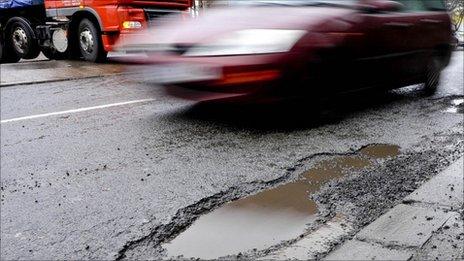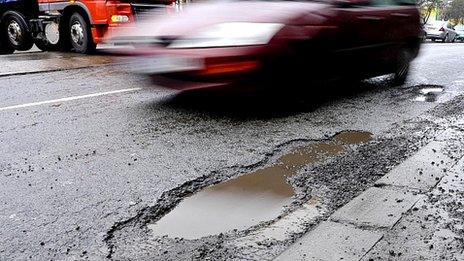Potholes: Increase in main roads in Wales failing the grade
- Published
The number of Welsh 'A' roads in a poor condition has increased by more than 50% in the three years up until 2011.
Councils say that a "significant problem" exists and are borrowing tens of millions of pounds from the Welsh government to repair damaged roads.
But the Welsh Local Government Association said Welsh roads will be in a "reasonable condition" this winter.
The Welsh government also said stocks of gritting salt are almost double what was held in the autumn of 2010.
The latest figures seen by BBC Wales for Sunday Politics Wales suggest that recent harsh winters have led to an increase in potholes across the country.
The statistics show that in the three years up to 2011 the number of main 'A' roads in a poor condition increased from 4.3% to 6.6%.
Updated figures for this year from the Local Government Data Unit show that more than one in every eight roads in Wales was in a poor condition - a rate of 13.5%.
Councils are responsible for the maintenance of 95% of roads in Wales, while the Welsh government looks after the remaining 5% of trunk roads.
Malcolm Griffiths, who runs a garage in Aberdare in the Cynon Valley, told Sunday Politics Wales that he had seen an increase in the number of cars with tyres, hubs and springs damaged by potholes in the last two years.
"A basic coil spring on a vehicle these days, you're looking at £45 to £50 plus the labour on top of that," said Mr Griffiths.
"An average alloy wheel, say for a Fiesta, could be in excess of £140. And we then you're only looking at the basic vehicles at the moment.
"You've then got to get the wheels alignment checked on top of that - which is £30 upwards."
Winter grit salt
An annual survey by the Asphalt Industry Alliance (AIA) suggested that it would take 17 years to clear the backlog of potholes in Wales, compared to nine years in London and 11 years in the rest of England.
AIA director David Weeks said: "Wales has been the poor relation in terms of funding and maintenance and condition of roads.
"There are a lot of reasons for that - there's a lot of rural roads in Wales which are not a high priority.
"There's also a lot of very important roads within the network linking communities which have been allowed to deteriorate, which the survey has flagged up."
He said another factor was the frequency of road surfacing - in Wales that gap can be more than 70 years, compared to 45 years in England and Scotland.
But Welsh councils are attempting to close some of those gaps by borrowing £172m from the Welsh government over three years under the Local Government Borrowing Initiative (LGBI).
An initial £60m has been allocated to councils which the Welsh government expects to "to address the pressures on road maintenance budgets and boost investment in local highway improvement schemes."
It is understood the Welsh government will shortly write to councils to invite them to submit bids to receive more funding under the LGBI.
"We recognise that there's a significant problem with the roads in Wales and that's why over the last year we've been working with the Welsh government to look at ways of investing additional funding," said Cllr Andrew Morgan, the WLGA deputy spokesperson for environment, sustainable development and waste.
"Certainly going into the winter, most authorities would have spent their allocation of the Local Government Borrowing Initiative funding which is in excess of £60m this year.
"That's direct investment into the roads and into the infrastructure but that's over and above the investment the local authorities normally put in.
"So I would say the roads this winter would certainly be in a reasonable condition but this investment is not just a one off it's a three year programme with the WG so over the next three years we should see a sustained improvement in our roads - both A, B and unclassified roads," Cllr Morgan said.
With winter approaching, the Welsh government said they have improved facilities for the storage of road salt and they will also be using it more efficiently.
The current stock of road salt stands at 243,000 tonnes compared with the 137,000 tonnes which were available in Autumn 2010.
- Published21 September 2012

- Published7 September 2012

- Published5 January 2011